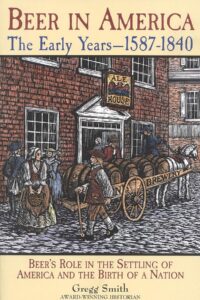When we picture early America, our minds often go to images of settlers, pioneers, and hardworking colonists. But there’s one crucial element of their daily lives that often gets overlooked—beer. Far from being just a casual drink, beer played an important role in early American society. It was part of the diet, a safe alternative to water, and even helped foster political and economic growth. Let’s take a closer look at how beer helped shape the foundations of the United States.
Beer: A Safer Option Than Water
In the early days of the colonies, access to clean drinking water wasn’t always guaranteed. Streams and rivers were easily contaminated by waste from households and farms, leading to diseases like dysentery and typhoid. However, beer, made through a fermentation process involving boiling water, provided a safer alternative.
Beer became a regular part of the daily diet for many colonists—not just for its taste but for its safety. It was consumed with every meal, even at breakfast! “Small beer,” a low-alcohol version of the beverage, was especially popular because it was refreshing and could be enjoyed by everyone without the strong effects of higher-alcohol drinks.
Beer as a Nutritional Lifeline
Life in early America was physically demanding. Whether people were farming, building, or working in other labor-intensive jobs, they needed a steady supply of calories. Beer, packed with carbohydrates, proteins, and essential vitamins, offered just that.
During tough winters or when food was scarce, beer became a vital part of the diet. While today we often think of beer as something to enjoy with friends, back then it was an essential source of sustenance that kept people energized and hydrated throughout the day.

Brewing in Colonial America
The first settlers brought European brewing traditions with them, but they had to adapt to the local environment and available ingredients. In many parts of the colonies, barley, the traditional grain used in beer, didn’t grow well. Colonists got creative, brewing beer with ingredients like corn, pumpkins, and molasses, leading to unique, homegrown American beer varieties.
Though brewing often started as a home-based activity, commercial breweries soon began appearing in major towns by the late 1600s. Cities like Boston and Philadelphia saw the rise of public houses and taverns where people gathered to drink, socialize, and do business.
Beer’s Role in the American Revolution
Beer also played a surprising role in America’s fight for independence. Taverns were not only social centers but also places where political conversations and planning took place. Many important moments leading up to the American Revolution unfolded over beers at these local establishments.
The Sons of Liberty, for instance, met at Boston’s Green Dragon Tavern, where they discussed strategies for resisting British rule. These tavern meetings were crucial for organizing protests and spreading revolutionary ideas, making beer a quiet participant in America’s push for independence.
Beer as an Economic Force
As the colonies grew, so did the beer industry. By the 19th century, brewing had become one of the country’s first major industries, especially with the influx of German immigrants who brought lager brewing techniques. However, the roots of this industry were planted much earlier with the rise of local breweries and taverns.
Beer production stimulated agriculture, creating demand for grains like barley and hops, and supported other businesses by providing jobs in brewing, transportation, and sales. Taverns were everywhere, not just providing drinks but also serving as vital hubs in local economies.
Bringing Communities Together
Taverns and public houses were more than just places to grab a drink…they were the heart of the community. They provided a space for locals and travelers alike to come together, share news, and enjoy each other’s company.
Communal events, such as harvest festivals or town meetings, often involved beer, helping to build bonds within early American communities. In a time when settlements were small and isolated, these gatherings were crucial for fostering relationships and a sense of togetherness.
Wrapping It Up: Beer’s Lasting Influence
These days, we often think of beer as a casual, social drink, but in early America, it was so much more. It provided safety, nutrition, and community, all while playing a significant role in the country’s political and economic development. In fact, beer even helped inspire and nurture the revolutionary ideas that led to the birth of a new nation.
So the next time you raise a glass, remember that beer didn’t just fuel the body…it helped fuel the formation of America itself.
Suggested Further Reading:
“Beer in America: The Early Years–1587-1840: Beer’s Role in the Settling of America and the Birth of a Nation” – by Gregg Smith
One of the most important but little-known aspects of early American history was beer’s role in the founding of our country and its formative years. The definitive account of beer’s impact on people and events that shaped the birth of a nation will astonish readers.
Leave a Reply